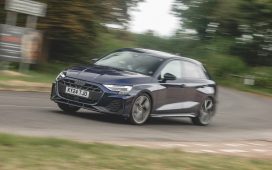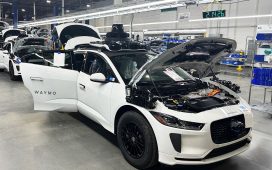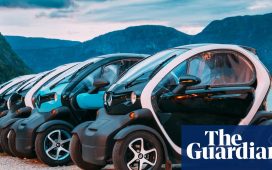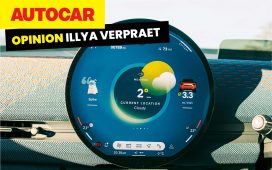- EU agreed the deal with Germany following a spat over combustion engines ban
- Combustion engine cars using only carbon-neutral e-fuels will be allowed to remain in showrooms in Europe beyond 2035
- DfT says industry must prove e-fuels are zero emission for rules to apply here
Germany and the European Union announced on Saturday an agreement in the dispute over the future of cars with combustion engines, allowing new passenger vehicles after 2035 provided they use climate-neutral ‘e-fuels’ only.
Just last month, the European Parliament had formally approved a law to effectively ban the sale of any new car with a combustion engine from 2035 – including petrol, diesel and hybrid models.
However, Germany threatened to block the law from being rubberstamped unless it included the loophole for new vehicles running exclusively on carbon-neutral e-fuels.
The UK Government does not yet have an official line on whether combustion engine cars using e-fuels will be allowed to remain in showrooms, but a Department for Transport spokesperson told us that if the motor industry can prove they are ‘zero-emission at the tailpipe’ they could stay on sale beyond 2035.
EU Commission Vice-President Frans Timmermans tweeted over the weekend: ‘We have found an agreement with Germany on the future use of e-fuels in cars.
‘We will work now on getting the CO2-standards for cars regulation adopted as soon as possible, and the Commission will follow-up swiftly with the necessary legal steps to implement recital 11.’
German Transport Minister, Volker Wissing, also took to the social media platform to say that ‘the way is clear’ for vehicles with internal combustion engines that only use CO2-neutral fuels to be newly registered even after 2035.
‘We secure opportunities for Europe by preserving important options for climate-neutral and affordable mobility,’ Mr Wissing wrote.
Related Articles
HOW THIS IS MONEY CAN HELP
In the UK, the Government has already set out its own schedule for banning petrol and diesel cars from 2030.
Some hybrids will be allowed to remain on sale until 2035 but from that date onwards it will only allow the registration of new cars and vans that produce zero tailpipe emissions.
Ministers have remained tight-lipped regarding their position on e-fuels.
The DfT’s official line states: ‘We remain committed to phasing out the sale of new petrol and diesel cars and vans by 2030, with all new cars and vans being zero emission at the tailpipe by 2035.’
However, a Department for Transport spokesperson told This in Money that if e-fuels are proven to be ‘effectively zero-emission’ they would adhere to its 2035 mandate and technically could keep new combustion engine models on sale after this date.
‘We don’t have an exact position on e-fuels at the moment. If industry can prove they are zero emission then they are fine,’ the spokesperson said.
They added: ‘The infrastructure is not necessarily there at the moment, that’s why the current default [for new cars on sale beyond 2035] is electric vehicles.
‘But in terms of a position right now on e-fuels, we don’t really have one which says we are for or against them.
‘If they comply the rules then great, but if not then they will fail to meet requirements to be completely zero emission by 2035.’
An initial proposal by European Union member countries on new carbon dioxide emission standards for cars had been postponed amid opposition from Germany.
The EU had wanted to ban the sale of all new cars with combustion engines from 2035, which would have effectively outlawed sales of all but electric vehicles.
Germany had demanded an exemption for cars that run exclusively on e-fuels, arguing that they are carbon neutral when produced using renewable energy and carbon captured from the air, so they wouldn´t spew further climate-changing emissions into the atmosphere.
Mr Wissing said on Saturday they had agreed on concrete procedural steps and that a specific timetable has been made binding.
‘We want the process to be completed by fall 2024,’ he added.
Mr Timmermans also wrote that ‘we will work now on getting the CO2-standards for cars regulation adopted as soon as possible’.
Ralf Diemer, managing director of the eFuel Alliance, welcomed the compromise between Germany and the EU: ‘By consistently and persistently sticking to technology openness, the FDP [German Federal Ministry of Digital Affairs and Transport] has opened a door that should make climate-friendly eFuels for passenger cars and light commercial vehicles possible in the long term.’
He added: ‘We have always pointed out that internal combustion vehicles powered by eFuels can be just as climate-friendly as an electric car running on green electricity.
‘The fact that the EU Commission is now prepared to recognise this starting position in a declaration is in itself an enormous step forward compared to the previous decision. Hopefully, the right decisions will be made on this basis soon in order to create planning and investment security.’
The arguments for and against e-fuels
E-fuels are made by synthesizing captured CO2 emissions and hydrogen produced using CO2-free electricity.
A selection of car brands – including Porsche and Mazda – have been looking into their development in recent years, however, they are not yet produced on a mass scale.
A study published days ago by the Potsdam Institute for Climate Research found that all planned e-fuel projects worldwide would only produce enough fuel to cover 10 per cent of Germany’s demand for e-fuel use in aviation, shipping and chemicals in the next few years.
EU’s U-turn on e-fuels comes under fire
Critics say battery-electric technology is a better fit for passenger cars and precious synthetic fuels should be used only where no other option is feasible, such as in aviation.
The environmental group Greenpeace provided a damning response as it criticised the agreement over the weekend.
‘This lazy compromise undermines climate protection in transport, and it harms Europe,’ the group wrote in a statement.
Julia Poliscanova, senior director for vehicles and emobility at campaigning think tank Transport & Environment also hit out and the move.
‘Europe needs to move forward and give clarity to its automotive industry which is in a race with the US and China,’ she said.
‘E-fuels are an expensive and massively inefficient diversion from the transformation to electric facing Europe’s carmakers. For the sake of Europe’s climate credibility, the 2035 zero-emissions cars deal needs to enter law without any further delay.’
A non-profit group of 47 businesses – including car makers Ford and Volvo – also voiced their concern with the decision, saying that the industry had already invested heavily in electric vehicles and any loophole on e-fuels would go against this.
Volvo CEO Jim Rowan said: ‘Now is not the time to put domestic political interests ahead of the health and welfare of our planet and EU citizens, and indeed of future generations. Now is the time for strong, decisive and progressive policy and leadership.
‘Volvo Cars is committed to being a fully electric car company by 2030 on our way to climate neutrality by 2040.
‘We are aware of our obligation to help protect the planet. We call on EU governments to show that they are too.’
Ford, which has also pledged to sell only fully electric passenger cars in Europe by 2030, also blasted suggestion of a U-turn on the ban on sales of combustion engines cars.
Martin Sander, general manager for Ford Model e Europe, said: ‘Ford is ready to go all-in electric.
‘The ongoing debate only creates uncertainty among consumers and is distracting from our joint efforts to tackle the climate crisis.’
Sandra Roling, director of transport of Climate Group, added: ‘Our asks are simple. Stick to the 2035 date, and no concessions for e-fuels. Give businesses the clarity and certainty they need to invest in the switch to electric vehicles.’
French Transport Minister Clément Beaune on Friday had also voiced concerns about the decision calling the agreement ‘risky’.
In an interview with POLITICO, he said: ‘Our choice for 2035 must remain – as we have collectively committed to do, including Germany – to get out of combustion engine vehicles.’
Some links in this article may be affiliate links. If you click on them we may earn a small commission. That helps us fund This Is Money, and keep it free to use. We do not write articles to promote products. We do not allow any commercial relationship to affect our editorial independence.








